Dr Sascha Dov Bachmann, Associate Professor in International Law, FMC, and Extraordinary Associate Professor in War Studies, FHS, will present on Russian Information Operations in Ukraine during NATO’s EUCOM/SHAPE International Legal Conference (2016)
“The Legal Aspects of the National Security Response to Russian Aggression”. The event brings together 100 experts who are to dicsuss the legal aspects of Russia’s aggressive politics in Eastern Europe. Sascha will reflect on his ongoing work on Hybrid Warfare, http://data.parliament.uk/writtenevidence/committeeevidence.svc/evidencedocument/defence-committee/russia-implications-for-uk-defence-and-security/written/28402.html, http://www.ajol.info/index.php/smsajms/article/view/117421 and https://www.researchgate.net/publication/277953401_RUSSIA’S_HYBRID_WARFARE_IN_THE_EAST_USING_THE_INFORMATION_SPHERE_AS_INTEGRAL_TO_HYBRID_WARFARE?_iepl[viewId]=5SEnEq26z9n23PZ8z1IVu0EN&_iepl[contexts][0]=timeline&_iepl[data][activityData][activityId]=277953401&_iepl[data][activityData][activityType]=Publication&_iepl[data][activityData][activityTimestamp]=1434326400&_iepl[data][viewType]=self&_iepl[interactionType]=publicationClickThrough.
Tagged / BU research
New comparative paper India-Nepal
 This week saw the publication of a new paper co-written by BU staff in the Sociological Bulletin. This is the first paper comparing Indian and Nepali Maoist rebels providing health services and health promotion to the communities under their influence. It presents the key provisions either made by rebel health workers themselves or by putting political pressure on government health workers to deliver better services in the areas controlled by rebels. Prof. Edwin van Teijlingen’s co-authors are based in India and Nepal. Prof. Gaurang R. Sahay is based at the Centre for Study of Developing Societies, Tata Institute of Social Sciences, Mumbai, India, whilst Bhimsen Devkota is Professor in Health Education, Tribhuvan University, Nepal.
This week saw the publication of a new paper co-written by BU staff in the Sociological Bulletin. This is the first paper comparing Indian and Nepali Maoist rebels providing health services and health promotion to the communities under their influence. It presents the key provisions either made by rebel health workers themselves or by putting political pressure on government health workers to deliver better services in the areas controlled by rebels. Prof. Edwin van Teijlingen’s co-authors are based in India and Nepal. Prof. Gaurang R. Sahay is based at the Centre for Study of Developing Societies, Tata Institute of Social Sciences, Mumbai, India, whilst Bhimsen Devkota is Professor in Health Education, Tribhuvan University, Nepal.
This sociological paper is based on a mixed-method approach comprising 15 interviews and a questionnaire survey with 197 Nepalese Maoist health workers and a secondary analysis of policy documents and other published materials on the Maoist health services of India. The paper suggests that rebel health services in India and Nepal followed a fairly similar approach to what and how they offered health care services to local populations. Maoists becoming a government party changed the political landscape for the rebel health workers in Nepal. However, not incorporating the Maoist rebel health workers into the government health system was a missed opportunity. There are lessons that India and Nepal can learn from each other. Should the Maoist rebels and the Government of India come to an agreement, potential for rebel health workers to be integrated in the official health care system should at least be considered.
The paper benefitted from an earlier review through eBU: Online Journal. The feedback from the eBU: Online Journal’s reviewers helped shape and polish the paper before submission to the Sociological Bulletin.![]()
Edwin van Teijlingen
CMMPH
References:
- Sahay, G., Devkota, B., van Teijlingen, E.R. (2016) Rebel Health Services in South Asia: Comparing Maoist-led Conflicts in India & Nepal, Sociological Bulletin 65(1):19-39.
Early labour: is it a problem in Texas?
Professor Vanora Hundley was recently invited to give a lecture to staff and students at UTHealth School of Nursing in Houston, Texas School of Nursing. The topic of her presentation was ‘Early labour – should we be telling women to stay at home?’

Early labour often presents a challenge for women and midwives in the UK. There is evidence that women admitted to hospital in the latent phase of labour are more likely to get unnecessary interventions, however women seek hospital admission for reassurance and support. The problem is further complicated by a lack of a clear definition of the latent phase as a recent systematic review, conducted with colleagues from the International Early Labour Research Group, shows (Hanley et al., 2016).
Nurses at UTHealth recognised the challenges of supporting women in early labour, but due to insurance policy requirements women are often not admitted to a labour and birthing room until they are 4 cm dilated or in the active labour phase. Instead women remain in a triage or holding area until they are 4 cm dilated, or may be sent home. The challenge in Texas is how to support women who are waiting for labour to progress.
CMMPH is conducting a number of studies to identify how best to support women in early labour and opportunities for collaboration with staff at UT Health were explored.
Reference: Hanley GE, Munro S, Greyson D, Gross MM, Hundley V, Spiby H and Janssen PA (2016) Diagnosing onset of labor: A systematic review of definitions in the research literature. BMC Pregnancy and Childbirth 16: 71
Photo shows Dr Rebecca Helmreich (UTH) & Prof Vanora Hundley (BU)
BU Academic appointed as Extraordinary Visiting Professor (AP) at Swedish Defence University
 Sascha Dov Bachmann, Associate Professor in International Law, FMC, has been made Extraordinary Visiting Professor (AP) in War Studies at the Swedish Defence University (FHS). This appointment recognizes his contribution to the work of the Department of Military Studies at FHS on the subject of Hybrid War and Hybrid Threats. He continues to collaborate with colleagues from Sweden, Germany and NATO on the subject.
Sascha Dov Bachmann, Associate Professor in International Law, FMC, has been made Extraordinary Visiting Professor (AP) in War Studies at the Swedish Defence University (FHS). This appointment recognizes his contribution to the work of the Department of Military Studies at FHS on the subject of Hybrid War and Hybrid Threats. He continues to collaborate with colleagues from Sweden, Germany and NATO on the subject.
Dr. Jenny Hall on spirituality in midwifery: new publication
 Dr. Jenny Hall in CMMPH published her latest article ‘Facilitating learning of spirituality in midwifery’ in the academic journal Spiritual Care [1]. She highlights that there has been considerable discussion in the literature around spirituality at the end of life but little relating to childbirth. Perhaps because of this facilitation of learning around the subject is limited. The aim of this article is to raise awareness of these issues and promote future discussion and research.
Dr. Jenny Hall in CMMPH published her latest article ‘Facilitating learning of spirituality in midwifery’ in the academic journal Spiritual Care [1]. She highlights that there has been considerable discussion in the literature around spirituality at the end of life but little relating to childbirth. Perhaps because of this facilitation of learning around the subject is limited. The aim of this article is to raise awareness of these issues and promote future discussion and research.
Congratulations
Prof. Edwin van Teijlingen
CMMPH
Reference:
Hall, J. (2016) Facilitating learning of spirituality in midwifery, Spiritual Care 5(2): 81–88. DOI: 10.1515/spircare-2016-0021,
THET presentation at BNAC
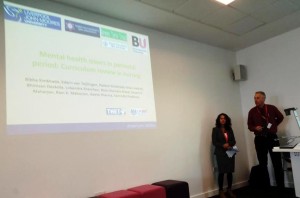 On Thursday 14th April Dr. Bibha Simkhada (Liverpool John Moores University & BU Visiting Faculty) and Prof. Edwin van Teijlingen presented their education research in Liverpool. The work is part of a THET-funded project at the 14th Britain-Nepal Academic Council (BNAC) Nepal Study Days. The presentation ‘Mental Health Training and Education in Nepal‘ is part of an international project led by Bournemouth University. BU collaborates with Tribhuvan University (Nepal’s largest & oldest university) and Liverpool John Moores University (LJMU). The project receives funding from DFID, and is managed through THET and supported locally in Nepal by a non-governmental organisation called Green Tara Nepal. The project takes UK volunteers, people with experience in midwifery, mental health, higher education, nursing, health visiting, etc. to the southern part of Nepal.
On Thursday 14th April Dr. Bibha Simkhada (Liverpool John Moores University & BU Visiting Faculty) and Prof. Edwin van Teijlingen presented their education research in Liverpool. The work is part of a THET-funded project at the 14th Britain-Nepal Academic Council (BNAC) Nepal Study Days. The presentation ‘Mental Health Training and Education in Nepal‘ is part of an international project led by Bournemouth University. BU collaborates with Tribhuvan University (Nepal’s largest & oldest university) and Liverpool John Moores University (LJMU). The project receives funding from DFID, and is managed through THET and supported locally in Nepal by a non-governmental organisation called Green Tara Nepal. The project takes UK volunteers, people with experience in midwifery, mental health, higher education, nursing, health visiting, etc. to the southern part of Nepal.
Mental health is a difficult topic to discuss in Nepal (as it often is in the UK). This makes it hard for front-line health workers, especially non-mental health specialists, to start a discussion about mental health issues with patients.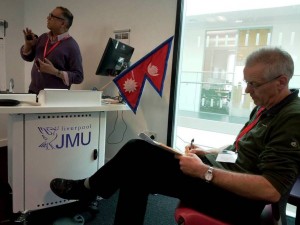
As part of this THET-funded programme to train community health worker such as Auxiliary Nurse Midwives (ANMs) on mental health issues related to pregnancy, we conducted a review of all relevant health curricula in Nepal. The key findings are that mental health issues in pregnancy and childbirth are often lacking in the curricula for both nurses and ANMs as a result community-based staff lack training in this topic. There is a great need for a curriculum to facilitate relevant training for ANMs.
We would like to repeat our call for volunteers. If you are a health or education professional with an interest in mental health and/or maternity care and you are interested in volunteering later this year for a week to ten days in Nepal please contact Edwin van Teijlingen (evteijlingen@bournemouth.ac.uk ).

BNAC presentation Jib Acharya
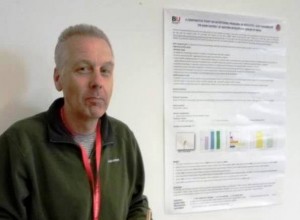 FHSS PhD student Jib Acharya presented a poster from his thesis research at last week’s BNAC (Britain-Nepal Academic Council) Study Days in Liverpool.[1] Jib’s PhD research focused on the knowledge, attitudes and beliefs of poor women about nutritious food and the study also identify major food barriers. He used a mixed-methods approached comprising a survey and qualitative research. The poster at BNAC focused on findings related to mothers’ knowledge, attitudes and beliefs about nutritious food. Jib’s research is supervised by Dr. Jane Murphy, Dr. Martin Hind and Prof. Edwin van Teijlingen. Some of the preliminary findings of this FHSS thesis have recently been published in two academic journals. [2-3]
FHSS PhD student Jib Acharya presented a poster from his thesis research at last week’s BNAC (Britain-Nepal Academic Council) Study Days in Liverpool.[1] Jib’s PhD research focused on the knowledge, attitudes and beliefs of poor women about nutritious food and the study also identify major food barriers. He used a mixed-methods approached comprising a survey and qualitative research. The poster at BNAC focused on findings related to mothers’ knowledge, attitudes and beliefs about nutritious food. Jib’s research is supervised by Dr. Jane Murphy, Dr. Martin Hind and Prof. Edwin van Teijlingen. Some of the preliminary findings of this FHSS thesis have recently been published in two academic journals. [2-3]
Prof. Edwin van Teijlingen
CMMPH
References:
- Acharya, J, van Teijlingen, E, Murphy, J, Hind, M. ‘A Comparative Study on Nutritional Problems in Preschool Aged Children of Kaski district of Nepal’ poster at Britain-Nepal Academic Council (BNAC) 14th Annual Nepal Study Days (Liverpool April 2016)
- Acharya, J., van Teijlingen, E., Murphy, J., Hind, M. (2015) Assessment of knowledge, beliefs and attitudes towards healthy diet among mothers in Kaski, Nepal, Participation 17(16): 61-72.
- Acharya, J., van Teijlingen, E., Murphy, J., Hind, M. (2015) Study of nutritional problems in preschool aged children in Kaski District in Nepal, Journal of Multidisciplinary Research in Healthcare 1(2): 97-118. http://dspace.chitkara.edu.in/jspui/bitstream/1/560/1/12007_JMRH_Acharya.
2016 BNAC conference with BU representation in Liverpool
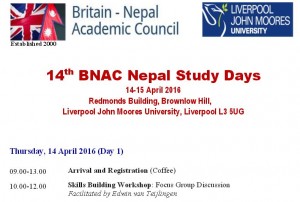 At the 14th BNAC (Britain-Nepal Academic Council) Nepal Study Days starting tomorrow (14th April 2016) FHSS’s PhD student Jib Acharya will presenting his poster on ‘A Comparative Study on Nutritional Problems in Preschool Aged Children of Kaski district of Nepal’. Jib’s PhD project is supervised by FHSS’s Prof. Edwin van Teijlingen, Dr. Jane Murphy and Dr. Martin Hind. Prof. Edwin van Teijlingen is also joint supervisor of Sarita Pandey (based at the University of Sheffield) whose poster ‘Factors that promote and hinder provision of maternal health services by Female Community Health Volunteers (FCHV) in rural Nepal’ will also be on display.
At the 14th BNAC (Britain-Nepal Academic Council) Nepal Study Days starting tomorrow (14th April 2016) FHSS’s PhD student Jib Acharya will presenting his poster on ‘A Comparative Study on Nutritional Problems in Preschool Aged Children of Kaski district of Nepal’. Jib’s PhD project is supervised by FHSS’s Prof. Edwin van Teijlingen, Dr. Jane Murphy and Dr. Martin Hind. Prof. Edwin van Teijlingen is also joint supervisor of Sarita Pandey (based at the University of Sheffield) whose poster ‘Factors that promote and hinder provision of maternal health services by Female Community Health Volunteers (FCHV) in rural Nepal’ will also be on display.
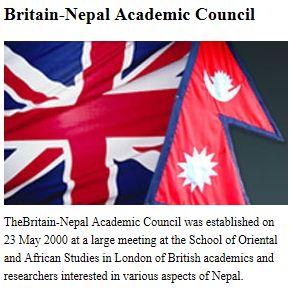 BU Visiting Faculty Dr. Bibha Simkhada (based at Liverpool John Moores University) will be presenting on the on-going THET-funded project ‘Mental Health Training and Education in Nepal’. This paper is part of the education stream of the conference,and its acceptance is a reflection of BU’s reputation in Educational Research. This paper has co-authors based in the UK and Nepal: Bibha Simkhada, Edwin van Teijlingen, Jillian Ireland, Padam Simkhada, Bhimsen Devkota, Lokendra Sherchan, Ram Chandra Silwal, Shyam K. Maharjan, Ram K. Maharjan, Geeta Sharma, and Samridhi Pradhan. Both Prof. Padam Simkhada and Ms. Jillian Ireland are BU Visiting Faculty.
BU Visiting Faculty Dr. Bibha Simkhada (based at Liverpool John Moores University) will be presenting on the on-going THET-funded project ‘Mental Health Training and Education in Nepal’. This paper is part of the education stream of the conference,and its acceptance is a reflection of BU’s reputation in Educational Research. This paper has co-authors based in the UK and Nepal: Bibha Simkhada, Edwin van Teijlingen, Jillian Ireland, Padam Simkhada, Bhimsen Devkota, Lokendra Sherchan, Ram Chandra Silwal, Shyam K. Maharjan, Ram K. Maharjan, Geeta Sharma, and Samridhi Pradhan. Both Prof. Padam Simkhada and Ms. Jillian Ireland are BU Visiting Faculty.
The first Study Day tomorrow starts with an invited Skills-building session on Focus Group Research by Prof. Edwin van Teijlingen. The final day includes a paper on ‘Impacts of Migration in Nepal’ by Prof. Padam Simkhada and Prof. Edwin van Teijlingen.
We are hoping to get the 15th BNAC Study Days to Bournemouth University for this time next year!
Prof. Edwin van Teijlingen
CMMPH
Sustainable Development Goals (SDGs) in Nepal
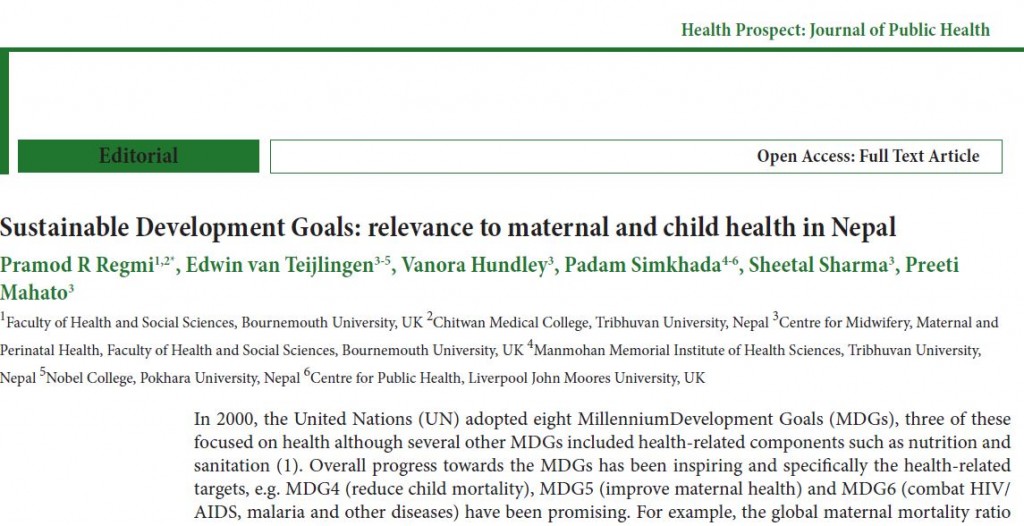
This month a team of FHSS staff published their editorial in the latest issue of the academic journal Health Prospect [1]. The lead author is Dr. Pramod Regmi working in collaboration with CMMPH’s Professor Vanora Hundley, FHSS PhD students Preeti Mahato and Sheetal Sharma, and Professor Padam Simkhada from Liverpool John Moores University who is also Visiting Faculty at BU. The Sustainable Development Goals (SDGs) are the new guidance for nations and international organisations worldwide following the completion of the Millennium Development Goals (MDGs) which run from 2000 to 2015. We wrote about the MDGs and their relevance to midwifery and maternity care in a previous article [2].
Edwin van Teijlingen
CMMPH
References:
- Regmi, P.R., van Teijlingen, E., Hundley, V., Simkhada, P., Sharma, S., Mahato, P. Sustainable Development Goals: relevance to maternal and child health in Nepal Health Prospect 2016; 15(1): 9-10.
- van Teijlingen, E., Hundley, V., Matthews, Z., Lewis, G., Graham, W.J., Campbell, J., ten Hoope-Bender, P., Sheppard, Z.A., Hulton, L. Millennium Development Goals: All good things must come to an end, so what next? Midwifery 2014; 30: 1-2.
Congratulations to Prof. Hundley on her latest systematic review paper

This week Professor Vanora Hundley in the Centre for Midwifery, Maternal & Perinatal Health (CMMPH) published a systematic review form with her international collaborators working on early labour. The paper is called ‘Diagnosing onset of labor: A systematic review of definitions in the research literature‘ and can be found it the Open Access journal BMC Pregnancy & Childbirth. [1]
Congratulations!
Prof. Edwin van Teijlingen
Reference:
- Hanley GE, Munro S, Greyson D, Gross MM, Hundley V, Spiby H and Janssen PA (2016) Diagnosing onset of labor: A systematic review of definitions in the research literature. BMC Pregnancy and Childbirth 16: 71 http://bmcpregnancychildbirth.biomedcentral.com/articles/10.1186/s12884-016-0857-4
New paper out this week by Dr. Regmi
 Since his arrival in the Faculty of Health & Social Sciences last year postdoctoral researcher Dr. Pramod Regmi has been busy getting his publications out. Yesterday saw the latest of his articles appear in print, this time in the latest issue of the Nepal Journal of Epidemiology. The editorial, co-authored with Dr. Om Kurmi (University of Oxford) and Dr. Puspa R. Pant at the University of the West of England, addresses the growing problem air pollution in low-income countries such as Nepal. The paper is called: ‘Implication of Air pollution on health effects in Nepal: Lessons from global research’. [1]
Since his arrival in the Faculty of Health & Social Sciences last year postdoctoral researcher Dr. Pramod Regmi has been busy getting his publications out. Yesterday saw the latest of his articles appear in print, this time in the latest issue of the Nepal Journal of Epidemiology. The editorial, co-authored with Dr. Om Kurmi (University of Oxford) and Dr. Puspa R. Pant at the University of the West of England, addresses the growing problem air pollution in low-income countries such as Nepal. The paper is called: ‘Implication of Air pollution on health effects in Nepal: Lessons from global research’. [1]
The journal is Open Access so the article can be accessed by anybody across the globe for free.
Congratulations!
Prof. Edwin van Teijlingen
CMMPH
References:
- Kurmi O, Regmi PR, Pant PR. Implication of Air pollution on health effects in Nepal: Lessons from global research. Nepal J Epidemiol. 2016;6(1); 525-527. (online at: http://www.nepjol.info/index.php/NJE/article/view/14733/11949 )
Blog THET volunteer on BU-led project
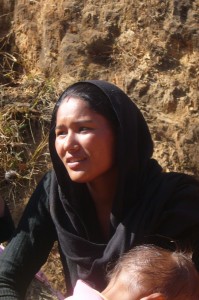
On previous occasions we have written on the BU Research Blog about our THET-funded project, for example earlier this year on the first training sessions in Nepal. Bournemouth University is leading on a project in collaboration with Tribhuvan University (the largest and oldest university in Nepal) and Liverpool John Moores University (LJMU). The project receives funding from DFID, and is managed through THET and supported locally in Nepal by a non-governmental organisation called Green Tara Nepal. We have been working with this charity for nearly ten years.
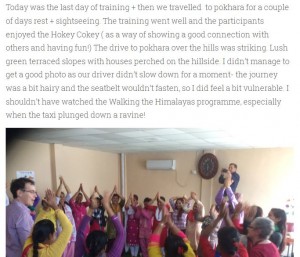 This time we would like to highlight a regular research blog written by Ish Fawcett who went out to Nepal last month as one of the UK volunteers. She has written some lovely blogs on her time in Nepal, about the training sessions as well as her general experiences of and observations on Nepal. Her blogs can be accessed here!
This time we would like to highlight a regular research blog written by Ish Fawcett who went out to Nepal last month as one of the UK volunteers. She has written some lovely blogs on her time in Nepal, about the training sessions as well as her general experiences of and observations on Nepal. Her blogs can be accessed here!
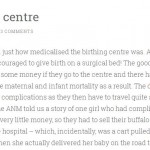
We would like to take this opportunity to repeat our call for volunteers. If you are a health or education professional with an interest in mental health and/or maternity care and you are interested in volunteering later this year for a week to ten days in Nepal please contact Edwin van Teijlingen (evteijlingen@bournemouth.ac.uk ).

Prof. Edwin van Teijlingen
CMMPH
NERC standard grants (July deadline) – internal competition launched

NERC introduced demand management measures in 2012. These were revised in 2015 to reduce the number and size of applications from research organisations for NERC’s discovery science standard grant scheme. Full details can be found in the BU policy document for NERC demand management measures at I:\R&KEO\Public\NERC demand management 2016.
As at March 2015, BU has been capped at one application per standard grant round. The measures only apply to NERC standard grants (including new investigators). An application counts towards an organisation, where the organisation is applying as the grant holding organisation (of the lead or component grant). This will be the organisation of the Principal Investigator of the lead or component grant.
BU process
As a result, BU has introduced a process for determining which application will be submitted to each NERC Standard Grant round. This will take the form of an internal competition, which will include peer review. The next available standard grant round is July 2016. The process for selecting an application for this round can be found in the process document in I:\R&KEO\Public\NERC demand management 2016 – the deadline for internal Expressions of Interest which will be used to determine which application will be submitted is 8th April 2016.
NERC have advised that where a research organisation submits more applications to any round than allowed under the cap, NERC will office-reject any excess applications, based purely on the time of submission through the Je-S system (last submitted = first rejected). However, as RKEO submit applications through Je-S on behalf of applicants, RKEO will not submit any applications that do not have prior agreement from the internal competition.
Appeals process
If an EoI is not selected to be submitted as an application, the Principal Investigator can appeal to Professor Tim McIntyre-Bhatty, Deputy Vice-Chancellor. Any appeals must be submitted within ten working days of the original decision. All appeals will be considered within ten working days of receipt.
RKEO Contacts
Please contact Jennifer Roddis, RKEO Research Facilitator – jroddis@bournemouth.ac.uk or Jo Garrad, RKEO Funding Development Manager – jgarrad@bournemouth.ac.uk if you wish to submit an expression of interest.
Research Blog Survey
Here at RKEO we are always trying to improve the services and information we provide to our audience and the research blog has been our main tool for communicating news to our audience. The research blog has been running since its first post back in March 2011, which makes it 5 years old this month!
With this historic achievement of age it doesn’t mean that there isn’t room for improvement. If you have the time it would be greatly appreciated if you could fill out this quick survey about the research blog. This will allow us to improve the site and in turn provide a better service for you!

FHSS paper in Journal of Neonatal Nursing
 The April issue of the Journal of Neonatal Nursing will publish the latest article written by a combination of Faculty of Health & Social Sciences staff and Visiting Faculty. The paper ‘Experiences of fathers with babies admitted to neonatal care units: A review of the literature’ offers a systematic narrative review on issues affecting fathers, whose babies are admitted to neonatal units. [1] The authors include Visiting Faculty Poole Hospital NHS Foundation Trust midwife Jillian Ireland and Prof. Minesh Khashu (consultant neonatologist) and FHSS staff Jaqui Hewitt-Taylor, Luisa Cescutti-Butler, and Edwin van Teijlingen. Twenty-seven papers in this interesting review highlighted four key themes: (1) stress & anxiety; (2) information (or lack thereof); (3) gender roles and (4) emotions. This paper adds to the growing literature (and understanding) of the role and place of men in maternity care generally and for fathers of babies in neonatal care in particular.
The April issue of the Journal of Neonatal Nursing will publish the latest article written by a combination of Faculty of Health & Social Sciences staff and Visiting Faculty. The paper ‘Experiences of fathers with babies admitted to neonatal care units: A review of the literature’ offers a systematic narrative review on issues affecting fathers, whose babies are admitted to neonatal units. [1] The authors include Visiting Faculty Poole Hospital NHS Foundation Trust midwife Jillian Ireland and Prof. Minesh Khashu (consultant neonatologist) and FHSS staff Jaqui Hewitt-Taylor, Luisa Cescutti-Butler, and Edwin van Teijlingen. Twenty-seven papers in this interesting review highlighted four key themes: (1) stress & anxiety; (2) information (or lack thereof); (3) gender roles and (4) emotions. This paper adds to the growing literature (and understanding) of the role and place of men in maternity care generally and for fathers of babies in neonatal care in particular.
Prof. Edwin van Teijlingen
CMMPH
References:
- Ireland, J., Khashu, M., Cescutti-Butler, L., van Teijlingen, E., Hewitt-Taylor, J. (2016) Experiences of fathers with babies admitted to neonatal care units: A review of the literature, Journal of Neonatal Nursing [pre-published]
Call for expressions of interest to join the EPSRC Associate Peer Review College
As part of its Peer Review College refresh programme taking place in summer 2016, EPSRC invites expressions of interest from candidates who wish to join its Associate Peer Review College.
The Peer Review College is vital for ensuring that EPSRC supports the highest-quality research. This call is open to anyone who fulfils the initial selection criteria set out in this document. Final selection of candidates from the pool of expressions of interest will be on the basis of individual knowledge, need for expertise in particular research areas and the structure of the new EPSRC Delivery Plan (published in spring 2016).
EPSRC is looking to increase access to expertise in cross and multi-disciplinary areas. However, all applications will be assessed on individual merit. Final decisions on those invited will be made centrally within EPSRC. The closing date for expressions of interest is 4pm, 10th May 2016
Who are the World’s Heaviest Tear Gas Users?
Check out the interactive maps on our BU Civic Media Hub website to find out!
Everyday tear gas is used around the world, from Brazil to Bahrain, from Thailand to the Occupied Territories of Palestine. Yet, while journalists file news stories of tear gas deployments, there is no national or international data recorded on its use or its effects.
Researchers and campaign groups work hard to raise awareness of the true effects of tear gas, yet its health effects remain undetermined and its death toll ill-defined. Data on tear gas is dispersed across nations, suppressed by governments, and spun by corporate manufacturers with a vested interest in keeping sales figures high. Largely unregulated and unmonitored, the for-profit transnational trade in tear gas continues to raise legal questions, as people around the world face its repressive and often violent effects.
Our 2015 Mapping the Media project sought to aggregate news reports on tear gassing in efforts to make public the frequency and motivations for its use. The maps form part of a larger research project led by Dr. Anna Feigenbaum, Senior Lecturer in Digital Storytelling at Bournemouth University. The 2015 mapping was done by Dr. Feigenbaum and her Undergraduate Research Assistant (URA) Laura McKenna with support from Dr. Pippa Gillingham and the BU Datalabs Team that came together through CCCP Fusion Grant in 2014.
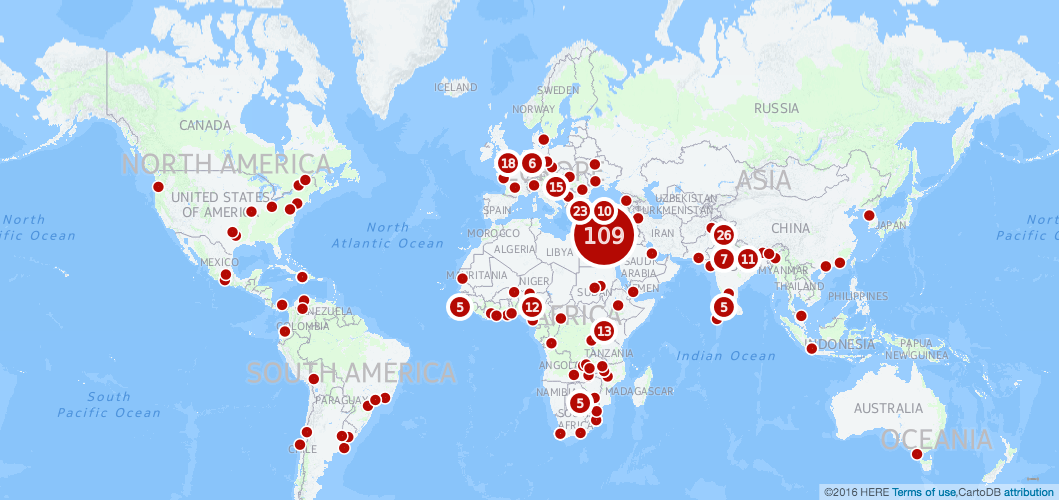
Find out more about digital storytelling for impact from Dr. Feigenbaum’s blog post on the topic.
BU BMC paper followed up by BMC Series Blog
 Our latest paper in the international journal BMC Pregnancy & Childbirth published late last month was highlighted yesterday in a BMC Series Blog.[1] The blog post reminds us that the media plays an important role in providing the general public with information about a range of issues, including pregnancy and childbirth. The visual media, such as television, can provide planned information (education), for example in documentaries, advertising and the news. Our paper “Is it realistic?” the portrayal of pregnancy and childbirth in the media’ looked into how the representation of childbirth in the mass media affects childbirth in society as there is evidence to suggest that it can have a negative effect. BMC Pregnancy & Childbirth is an Open Access journal therefore the paper is freely available for anybody across the globe with an internet connection, for access click here.
Our latest paper in the international journal BMC Pregnancy & Childbirth published late last month was highlighted yesterday in a BMC Series Blog.[1] The blog post reminds us that the media plays an important role in providing the general public with information about a range of issues, including pregnancy and childbirth. The visual media, such as television, can provide planned information (education), for example in documentaries, advertising and the news. Our paper “Is it realistic?” the portrayal of pregnancy and childbirth in the media’ looked into how the representation of childbirth in the mass media affects childbirth in society as there is evidence to suggest that it can have a negative effect. BMC Pregnancy & Childbirth is an Open Access journal therefore the paper is freely available for anybody across the globe with an internet connection, for access click here.
 Our paper is great example of interdisciplinary research, as celebrated at the forthcoming Interdisciplinary Research Sector Day on June 21st (see here). The authors of our paper combine expertise in media studies, midwifery, sociology and health services research. Moreover, it involved collaborations across universities (Bournemouth and Stirling) and within BU across faculties, namely the Faculty of Media & Communcation and the Faculty of Health & Social Sciences.
Our paper is great example of interdisciplinary research, as celebrated at the forthcoming Interdisciplinary Research Sector Day on June 21st (see here). The authors of our paper combine expertise in media studies, midwifery, sociology and health services research. Moreover, it involved collaborations across universities (Bournemouth and Stirling) and within BU across faculties, namely the Faculty of Media & Communcation and the Faculty of Health & Social Sciences.
Ann Luce, Marilyn Cash, Vanora Hundley, Helen Cheyne, Edwin van Teijlingen & Catherine Angell
Reference:
- Luce, A., Cash, M., Hundley, V., Cheyne, H., van Teijlingen, E., Angell, C., (2016) “Is it realistic?” the portrayal of pregnancy and childbirth in the media BMC Pregnancy & Childbirth 16: 40 http://bmcpregnancychildbirth.biomedcentral.com/articles/10.1186/s12884-016-0827-x











 BU attendance at third annual GCPHR meeting in June
BU attendance at third annual GCPHR meeting in June Interactive Tangible and Intangible Heritage Applications – BU student work featured in new book chapter
Interactive Tangible and Intangible Heritage Applications – BU student work featured in new book chapter Second NIHR MIHERC meeting in Bournemouth this week
Second NIHR MIHERC meeting in Bournemouth this week MSCA Postdoctoral Fellowships 2025 Call
MSCA Postdoctoral Fellowships 2025 Call ERC Advanced Grant 2025 Webinar
ERC Advanced Grant 2025 Webinar Horizon Europe Work Programme 2025 Published
Horizon Europe Work Programme 2025 Published Horizon Europe 2025 Work Programme pre-Published
Horizon Europe 2025 Work Programme pre-Published Update on UKRO services
Update on UKRO services European research project exploring use of ‘virtual twins’ to better manage metabolic associated fatty liver disease
European research project exploring use of ‘virtual twins’ to better manage metabolic associated fatty liver disease